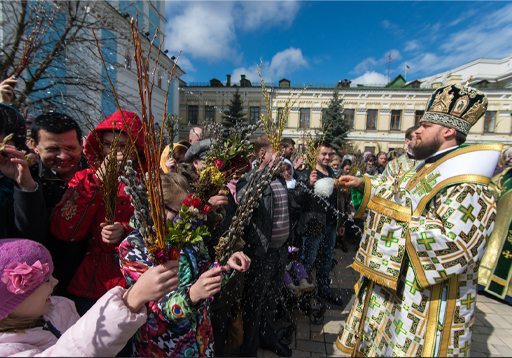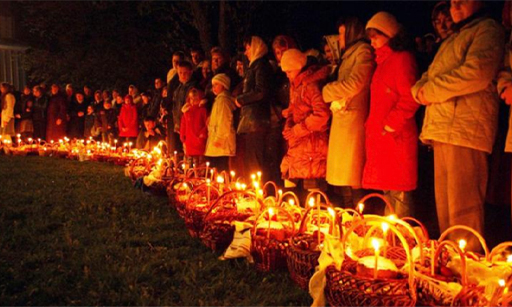5.1 Easter
The majority of Ukrainians are Orthodox Christians. The biggest Orthodox feast is Easter (‘Velykden’). The Ukrainian churches (both the Orthodox Church and the Greek Catholic Church in Ukraine), belong to the group of churches who celebrate Easter on a different day from the West.
Eastern Churches (Orthodox and Greek Catholic) have four periods of fasting. The most important of these is Lent. It starts seven weeks before Easter and it is a time when quite a lot of Ukrainian Orthodox Christians and Greek Catholics abstain from animal-based food.
Palm Sunday is called ‘Willow Sunday’ (‘Verbna nedilia’) in Ukraine. People come to churches with branches of willow, which are blessed by the priest. Palms grow in Crimea, but in other parts of Ukraine this warmth-loving plant can be seen only in botanical gardens, so Ukrainians use willows, which commonly grow all over Ukraine.
During Holy Week Ukrainians prepare to celebrate what, for Christians, is the biggest day in a year: spring-clean their homes and cook special food. Two most important foods for Easter are ‘paska’ (sweet bread) and ‘krashanky’, hard-boiled eggs dyed in onion peel (which make eggs brown) or in artificial dyes (red, green, yellow and blue). One of the most loved Ukrainian traditions is blessing baskets with Easter food in churches late on Saturday and early on Sunday morning, straight after the four-hours long night service.
The baskets contain animal-based food from which Orthodox Christians and Greek Catholics try abstaining during Great Lent: ‘paska’ (Easter bread of brioche type), ‘krashanky’ (dyed hard-boiled eggs), butter, cheese, sausages, cooked meat – and salt and horseradish or ready horseradish sauce to accompany them. In other words, people bring their Easter breakfast to be blessed.
At the start of the Easter meal ‘egg fights’ often take place. The winner is the person whose egg does not crack after hitting another person’s egg, or after being hit by it.
Instead of saying ‘hello’ people greet each other with words ‘Khrystos Voskres!’ – ‘Voistynu Voskres!’ which means ‘Christ Is Risen!’ – ‘He Is Risen Indeed!’
| Христос Воскрес! | Khrystos Voskres! |
| Воістину Воскрес! | Voistynu Voskres! |


